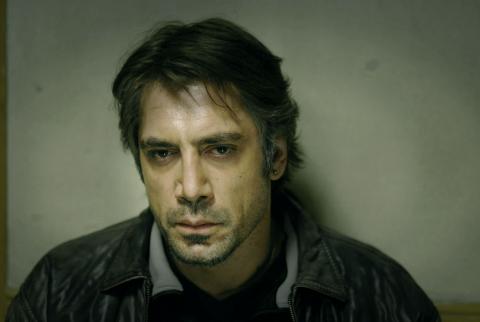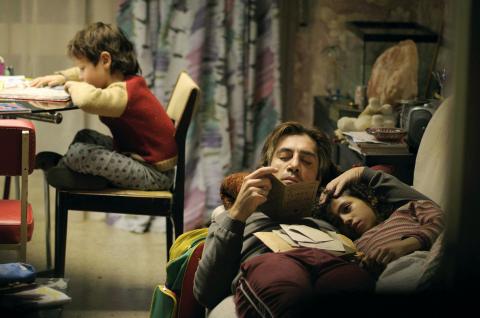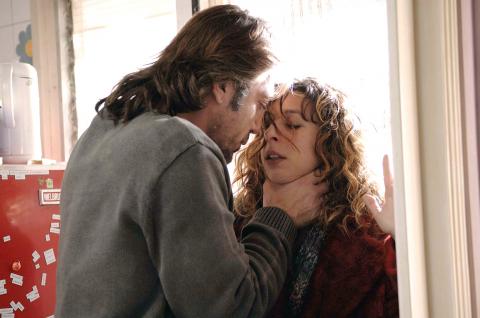A lejandro Gonzalez Inarritu is not a man afraid of tackling the big issues. Biutiful, his most recent effort, deals with nothing less than the painful joy of life, in all its passion and senselessness. Inarritu, who made Babel (2006) and 21 Grams (2003), is no stranger to this difficult territory, and his films can often seem portentous and over-laden with a sense of divine mystery.
Biutiful, which is by no means a simple or a light film, is at least relatively straightforward in its narrative structure, telling a story of the last days of a petty criminal, Uxbal (Javier Bardem), who juggles the demands of paying off the cops, human trafficking for the mob, a bipolar wife who is having an affair with his boss and two kids. He’s also terminally ill with cancer. Uxbal is not able to get very much right in his life, and even as he tries to put things in order in his final days, he manages to screw up spectacularly.
The title of the film derives from a misspelling Uxbal gives to his daughter to help with her homework. It is a touching moment of family harmony, and the mistake is, in usual Inarritu fashion, endowed with significance. It is almost as though a voice, enunciating in Biblical tones, announces “such is the divinity of life, that even its multitude of horrors and imperfections cannot sully it.”

Photo Courtesy of Serenity Entertainment International
Biutiful could easily collapse under the weight of its own sense of religious mystery, but it is saved almost single-handedly by Bardem, whose performance has such a sense of gravity that he prevents the film from slipping into a torrid mass of cheap sentimentality.
In Biutiful, Inarritu embarks on a description of the seamy underbelly of Barcelona. It is an ugly world and Uxbal has been born and bred in it. He might be a minor figure in the criminal culture that pervades every aspect of his life, but he is capable of imposing a sense of threat or protection over those people — Chinese sweatshop workers and African sellers of pirated wares — who are his nominal charges. He even tries to make their lives a little more bearable, though his instinct to look out for number one gets in the way of his best intentions.
Uxbal is involved with two Chinese sweatshop owners and an African couple whose stories are deftly sketched into the margins of the criminal’s grander tragedy.

Photo Courtesy of Serenity Entertainment International
Inarritu draws a wonderfully variegated picture of this hideous world, and there are some exceptional performances by Maricel Alvarez as Uxbal’s wife and Diaryatou Daff as Ige, a woman who loses her husband to the immigration authorities after a misdirected payoff for which Uxbal is ultimately responsible.
As Uxbal tries to tidy up the tangled ends of his life, the setting shifts through dank interior spaces where scenes of exploitation, friendship, rivalry, lust, love and consolation are enacted. It is like one of those medieval morality tales that portray the sins and weaknesses of people who live their lives in the expectation of redemption. In fact, the film reads very much like an extended meditation on the workings of the Catholic doctrine of grace. This is never specifically stated, but Uxbal does find some redemption. The deity works in mysterious ways, and Inarritu seems to think this is sufficient to hold this story together.

Photo Courtesy of Serenity Entertainment International

Photo Courtesy of Serenity Entertainment International

June 9 to June 15 A photo of two men riding trendy high-wheel Penny-Farthing bicycles past a Qing Dynasty gate aptly captures the essence of Taipei in 1897 — a newly colonized city on the cusp of great change. The Japanese began making significant modifications to the cityscape in 1899, tearing down Qing-era structures, widening boulevards and installing Western-style infrastructure and buildings. The photographer, Minosuke Imamura, only spent a year in Taiwan as a cartographer for the governor-general’s office, but he left behind a treasure trove of 130 images showing life at the onset of Japanese rule, spanning July 1897 to

In an interview posted online by United Daily News (UDN) on May 26, current Chinese Nationalist Party (KMT) Chairman Eric Chu (朱立倫) was asked about Taichung Mayor Lu Shiow-yen (盧秀燕) replacing him as party chair. Though not yet officially running, by the customs of Taiwan politics, Lu has been signalling she is both running for party chair and to be the party’s 2028 presidential candidate. She told an international media outlet that she was considering a run. She also gave a speech in Keelung on national priorities and foreign affairs. For details, see the May 23 edition of this column,

The Taiwan People’s Party (TPP) on May 18 held a rally in Taichung to mark the anniversary of President William Lai’s (賴清德) inauguration on May 20. The title of the rally could be loosely translated to “May 18 recall fraudulent goods” (518退貨ㄌㄨㄚˋ!). Unlike in English, where the terms are the same, “recall” (退貨) in this context refers to product recalls due to damaged, defective or fraudulent merchandise, not the political recalls (罷免) currently dominating the headlines. I attended the rally to determine if the impression was correct that the TPP under party Chairman Huang Kuo-Chang (黃國昌) had little of a

At Computex 2025, Nvidia CEO Jensen Huang (黃仁勳) urged the government to subsidize AI. “All schools in Taiwan must integrate AI into their curricula,” he declared. A few months earlier, he said, “If I were a student today, I’d immediately start using tools like ChatGPT, Gemini Pro and Grok to learn, write and accelerate my thinking.” Huang sees the AI-bullet train leaving the station. And as one of its drivers, he’s worried about youth not getting on board — bad for their careers, and bad for his workforce. As a semiconductor supply-chain powerhouse and AI hub wannabe, Taiwan is seeing